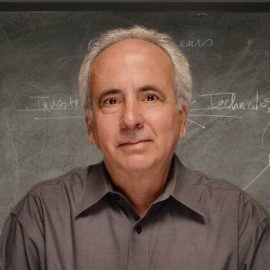By Lilly Drumeva-O’Reilly
We are going through difficult times. The COVID-19 pandemic is affecting our lives and the economy. Isolation is hard and in order to stay connected with the world, we need lots of electronic devices at home. We communicate mostly online and physical contacts are restricted to the minimum. Technology is also needed in the medical profession – equipment and diagnostic tools.
This time I decided to interview Norman Winarsky. He is past President of SRI Ventures at SRI International, a world-leading research institute founded by Stanford University in 1946. He has been a founder and leader of SRI’s venture strategy and process, which has resulted in more than sixty ventures worth over $20 billion. Norman helped create and build companies ranging from artificial intelligence, natural language, and computer vision, to medical devices, robotics, and nanotechnology. He was a co-founder and board member of Siri, which was spun out from SRI in January 2008 and acquired by Apple in April 2010. Siri has become a worldwide phenomenon, establishing the breakthrough market category of virtual personal assistant. He is currently a lecturer at Stanford University, and co-author of “If You Really Want to Change the World; A Guide to Creating, Building, and Sustaining Breakthrough Ventures”, published by Harvard Business Review Press.
Norman Winarsky is one of the key mentors of the Bulgarian Entrepreneurship Center foundation and has visited Bulgaria several times, giving lectures and workshops.
Dr. Winarsky, you are a brilliant mind, an inventor of breakthrough technology, how could it help in the coronavirus crisis now?
The COVID-19 pandemic is a hundred-year event that will fundamentally transform society. We have learned a great deal about the failures of our existing institutions, as well as some of the successes. In times of great change, there are great opportunities. I am currently working on building two different companies in healthcare that will reduce times for clinical trials; a robotics company for product delivery; a company for helping track the virus; and more.
One of your special areas is AI. How will it develop further in a situation of crisis?
AI, using Deep Learning, will be used for helping track the spread of the virus, for helping design new drugs, and for helping recognize existing drugs that might be of assistance. Robots will also replace humans for as many tasks as possible, in order to reduce virus contagion. AI will be in every robotic system to help it navigate, manipulate objects, and reason about the task.
Technology may help to better track patients with coronavirus. Tell us your thoughts?
Many of the technology companies that have been built in the last 10 – 20 years are helping us track patients who volunteer to be tracked. GPS of course will track location. Social networks such as Facebook can track friends who might have had an interaction. Communication tools such as Zoom can help us quickly reach out to individuals with the virus or people who have been in touch with the individuals.
How is life going to be after the crisis? Are we going to continue to work mostly from home and communicate mostly online?
The crisis will not end, but slowly diminish over time. We have proven that working from home is possible and for many businesses, productive. We have to measure the loss in productivity each day from commuting – usually an hour or two – compared to the possible loss in productivity by not being physically present. More technologies will make “telecommuting” even more possible. The current video streaming with companies like Zoom will eventually give way to companies that give a much greater sense of presence – using 3D, multiple screens, multiple cameras, and more. The future for these companies is bright. My guess is that individuals will now work from home multiple days a week, and physical presence perhaps only one or two days a week.
You are a professor at Stanford University, a leader in scientific research. Please share with us if you know of any progress in finding treatment for coronavirus.
I am aware of great researchers who are working on existing drugs that might be effective for COVID-19. There is real hope there.
On what kind of projects are you working at the moment? What are your plans for the future?
I mentioned the projects above. My plans are to continue in my roles at Stanford, at Relay Ventures investing in companies, at the American Medical Association to help build companies, and as advisor and board member for companies leading the development of new AI technologies.
Mr. Winarsky, thank you for this interview, I wish you good luck!




Recent Comments